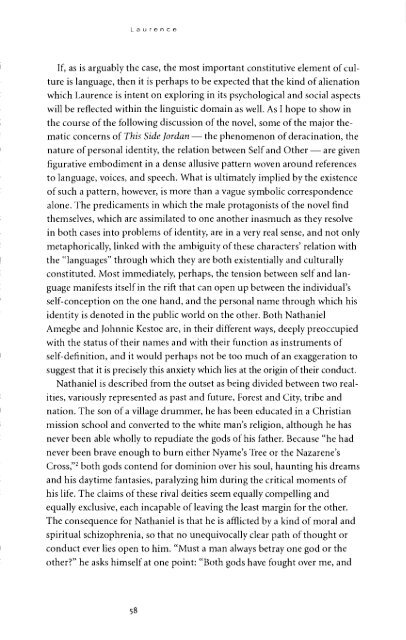The Carpathians - University of British Columbia
The Carpathians - University of British Columbia
The Carpathians - University of British Columbia
You also want an ePaper? Increase the reach of your titles
YUMPU automatically turns print PDFs into web optimized ePapers that Google loves.
If, as is arguably the case, the most important constitutive element <strong>of</strong> culture<br />
is language, then it is perhaps to be expected that the kind <strong>of</strong> alienation<br />
which Laurence is intent on exploring in its psychological and social aspects<br />
will be reflected within the linguistic domain as well. As I hope to show in<br />
the course <strong>of</strong> the following discussion <strong>of</strong> the novel, some <strong>of</strong> the major thematic<br />
concerns <strong>of</strong> This Side Jordan — the phenomenon <strong>of</strong> deracination, the<br />
nature <strong>of</strong> personal identity, the relation between Self and Other — are given<br />
figurative embodiment in a dense allusive pattern woven around references<br />
to language, voices, and speech. What is ultimately implied by the existence<br />
<strong>of</strong> such a pattern, however, is more than a vague symbolic correspondence<br />
alone. <strong>The</strong> predicaments in which the male protagonists <strong>of</strong> the novel find<br />
themselves, which are assimilated to one another inasmuch as they resolve<br />
in both cases into problems <strong>of</strong> identity, are in a very real sense, and not only<br />
metaphorically, linked with the ambiguity <strong>of</strong> these characters' relation with<br />
the "languages" through which they are both existentially and culturally<br />
constituted. Most immediately, perhaps, the tension between self and language<br />
manifests itself in the rift that can open up between the individual's<br />
self-conception on the one hand, and the personal name through which his<br />
identity is denoted in the public world on the other. Both Nathaniel<br />
Amegbe and Johnnie Kestoe are, in their different ways, deeply preoccupied<br />
with the status <strong>of</strong> their names and with their function as instruments <strong>of</strong><br />
self-definition, and it would perhaps not be too much <strong>of</strong> an exaggeration to<br />
suggest that it is precisely this anxiety which lies at the origin <strong>of</strong> their conduct.<br />
Nathaniel is described from the outset as being divided between two realities,<br />
variously represented as past and future, Forest and City, tribe and<br />
nation. <strong>The</strong> son <strong>of</strong> a village drummer, he has been educated in a Christian<br />
mission school and converted to the white man's religion, although he has<br />
never been able wholly to repudiate the gods <strong>of</strong> his father. Because "he had<br />
never been brave enough to burn either Nyame's Tree or the Nazarene's<br />
Cross," 2 both gods contend for dominion over his soul, haunting his dreams<br />
and his daytime fantasies, paralyzing him during the critical moments <strong>of</strong><br />
his life. <strong>The</strong> claims <strong>of</strong> these rival deities seem equally compelling and<br />
equally exclusive, each incapable <strong>of</strong> leaving the least margin for the other.<br />
<strong>The</strong> consequence for Nathaniel is that he is afflicted by a kind <strong>of</strong> moral and<br />
spiritual schizophrenia, so that no unequivocally clear path <strong>of</strong> thought or<br />
conduct ever lies open to him. "Must a man always betray one god or the<br />
other?" he asks himself at one point: "Both gods have fought over me, and

















